formerly eScholarship Editions


|
|
|
|
Your request for similar items found 20 book(s). | Modify Search | Displaying 1 - 20 of 20 book(s) | |
| 1. | 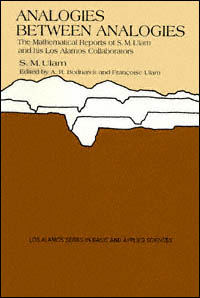 | Title: Analogies between analogies: the mathematical reports of S.M. Ulam and his Los Alamos collaborators Author: Ulam, Stanislaw M Published: University of California Press, 1990 Subjects: Science | Mathematics | Physical Sciences Similar Items |
| 2. |  | Title: Hellenistic philosophy of mind Author: Annas, Julia Published: University of California Press, 1994 Subjects: Classics | Social and Political Thought | Intellectual History | Classical Philosophy | Philosophy | Rhetoric Publisher's Description: Hellenistic Philosophy of Mind is an elegant survey of Stoic and Epicurean ideas about the soul - an introduction to two ancient schools whose belief in the soul's physicality offer compelling parallels to modern approaches in the philosophy of mind. Annas incorporates recent thinking on Hellenistic philosophy of mind so lucidly and authoritatively that specialists and nonspecialists alike will find her book rewarding.In part, the Hellenistic epoch was a "scientific" period that broke with tradition in ways that have an affinity with the modern shift from the seventeenth and eighteenth centuries to the present day. Hellenistic philosophy of the soul, Annas argues, is in fact a philosophy of mind, especially in the treatment of such topics as perception, thought, and action. [brief] Similar Items |
| 3. |  | Title: Three Mile Island: a nuclear crisis in historical perspective Author: Walker, J. Samuel Published: University of California Press, 2004 Subjects: History | Technology and Instruments | Environment | Technology and Society | United States History Publisher's Description: Twenty-five years ago, Hollywood released The China Syndrome, featuring Jane Fonda and Michael Douglas as a TVnews crew who witness what appears to be a serious accident at a nuclear power plant. In a spectacular coincidence, on March 28, 1979, less than two weeks after the movie came out, the worst accident in the history of commercial nuclear power in the United States occurred at Three Mile Island. For five days, the citizens of central Pennsylvania and the entire world, amid growing alarm, followed the efforts of authorities to prevent the crippled plant from spewing dangerous quantities of radiation into the environment. This book is the first comprehensive account of the causes, context, and consequences of the Three Mile Island crisis. In gripping prose, J. Samuel Walker captures the high human drama surrounding the accident, sets it in the context of the heated debate over nuclear power in the seventies, and analyzes the social, technical, and political issues it raised. His superb account of those frightening and confusing days will clear up misconceptions held to this day about Three Mile Island. The heart of Walker's suspenseful narrative is a moment-by-moment account of the accident itself, in which he brings to life the players who dealt with the emergency: the Nuclear Regulatory Commission, the state of Pennsylvania, the White House, and a cast of scientists and reporters. He also looks at the aftermath of the accident on the surrounding area, including studies of its long-term health effects on the population, providing a fascinating window onto the politics of nuclear power and an authoritative account of a critical event in recent American history. [brief] Similar Items |
| 4. | 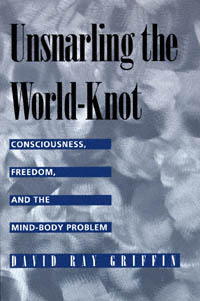 | Title: Unsnarling the world-knot: consciousness, freedom, and the mind-body problem Author: Griffin, David Ray 1939- Published: University of California Press, 1998 Subjects: Philosophy | Intellectual History Publisher's Description: The mind-body problem, which Schopenhauer called the "world-knot," has been a central problem for philosophy since the time of Descartes. Among realists - those who accept the reality of the physical world - the two dominant approaches have been dualism and materialism, but there is a growing consensus that, if we are ever to understand how mind and body are related, a radically new approach is required.David Ray Griffin develops a third form of realism, one that resolves the basic problem (common to dualism and materialism) of the continued acceptance of the Cartesian view of matter. In dialogue with various philosophers, including Dennett, Kim, McGinn, Nagel, Seager, Searle, and Strawson, Griffin shows that materialist physicalism is even more problematic than dualism. He proposes instead a pan-experientialist physicalism grounded in the process philosophy of Alfred North Whitehead. Answering those who have rejected "pan-psychism" as obviously absurd, Griffin argues compellingly that pan-experientialism, by taking experience and spontaneity as fully natural, can finally provide a naturalistic account of the emergence of consciousness - an account that also does justice to the freedom that we all presuppose in practice. [brief] Similar Items |
| 5. | 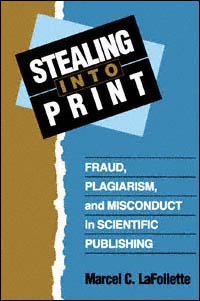 | Title: Stealing into print: fraud, plagiarism, and misconduct in scientific publishing Author: LaFollette, Marcel C. (Marcel Chotkowski) Published: University of California Press, 1992 Subjects: Media Studies | History and Philosophy of Science | Print Media | Public Policy | Science Publisher's Description: False data published by a psychologist influence policies for treating the mentally retarded. A Nobel Prize-winning molecular biologist resigns the presidency of Rockefeller University in the wake of a scandal involving a co-author accused of fabricating data. A university investigating committee declares that almost half the published articles of a promising young radiologist are fraudulent.Incidents like these strike at the heart of the scientific enterprise and shake the confidence of a society accustomed to thinking of scientists as selfless seekers of truth. Marcel LaFollette's long-awaited book gives a penetrating examination of the world of scientific publishing in which such incidents of misconduct take place. Because influential scientific journals have been involved in the controversies, LaFollette focuses on the fragile "peer review" process - the editorial system of seeking pre-publication opinions from experts. She addresses the cultural glorification of science, which, combined with a scientist's thirst for achievement, can seem to make cheating worth the danger. She describes the great risks taken by the accusers - often scholars of less prestige and power than the accused - whom she calls "nemesis figures" for their relentless dedication to uncovering dishonesty.In sober warning, LaFollette notes that impatient calls from Congress, journalists, and taxpayers for greater accountability from scientists have important implications for the entire system of scientific research and communication.Provocative and learned, Stealing Into Print is certain to become the authoritative work on scientific fraud, invaluable to the scientific community, policy makers, and the general public. [brief] Similar Items |
| 6. | 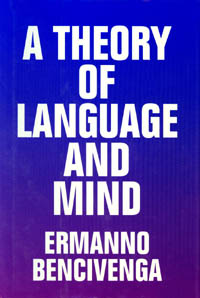 | Title: A theory of language and mind Author: Bencivenga, Ermanno 1950- Published: University of California Press, 1997 Subjects: Philosophy Publisher's Description: In his most recent book, Ermanno Bencivenga offers a stylistically and conceptually exciting investigation of the nature of language, mind, and personhood and the many ways the three connect. Bencivenga, one of the most iconoclastic voices to emerge in contemporary American philosophy, contests the basic assumptions of analytic (and also, to an extent, postmodern) approaches to these topics. His exploration leads through fascinating discussions of education, courage, pain, time and history, selfhood, subjectivity and objectivity, reality, facts, the empirical, power and transgression, silence, privacy and publicity, and play - all themes that are shown to be integral to our thinking about language. Relentessly bending the rules, Bencivenga frustrates our expectations of a "proper" theory of language. He invokes the transgressions of Nietzsche and Wittgenstein even as he appropriates the aphoristic style of Wittgenstein's Tractatus . Written in a philosophically playful and experimental mode, A Theory of Language and Mind draws the reader into a sense of continual surprise, therapeutic discomfort, and discovery. [brief] Similar Items |
| 7. | 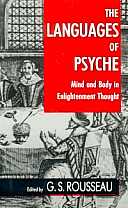 | Title: The Languages of psyche: mind and body in Enlightenment thought: Clark Library lectures, 1985-1986 Author: Rousseau, G. S. (George Sebastian) Published: University of California Press, 1991 Subjects: History | Medicine | History and Philosophy of Science | European History | European Literature Publisher's Description: The Languages of Psyche traces the dualism of mind and body during the "long eighteenth century," from the Restoration in England to the aftermath of the French Revolution. Ten outstanding scholars investigate the complex mind-body relationship in a variety of Enlightenment contexts - science, medicine, philosophy, literature, and everyday society. No other recent book provides such an in-depth, suggestive resource for philosophers, literary critics, intellectual and social historians, and all who are interested in Enlightenment studies. [brief] Similar Items |
| 8. | 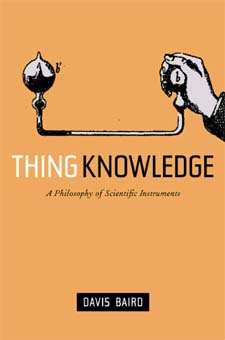 | Title: Thing knowledge: a philosophy of scientific instruments Author: Baird, Davis Published: University of California Press, 2004 Subjects: Philosophy | Technology and Society Publisher's Description: Western philosophers have traditionally concentrated on theory as the means for expressing knowledge about a variety of phenomena. This absorbing book challenges this fundamental notion by showing how objects themselves, specifically scientific instruments, can express knowledge. As he considers numerous intriguing examples, Davis Baird gives us the tools to "read" the material products of science and technology and to understand their place in culture. Making a provocative and original challenge to our conception of knowledge itself, Thing Knowledge demands that we take a new look at theories of science and technology, knowledge, progress, and change. Baird considers a wide range of instruments, including Faraday's first electric motor, eighteenth-century mechanical models of the solar system, the cyclotron, various instruments developed by analytical chemists between 1930 and 1960, spectrometers, and more. [brief] Similar Items |
| 9. |  | Title: The nuclear seduction: why the arms race doesn't matter and what does Author: Schwartz, William A Published: University of California Press, 1989 Subjects: Politics | Sociology | Social Problems | Public Policy | Science Similar Items |
| 10. | 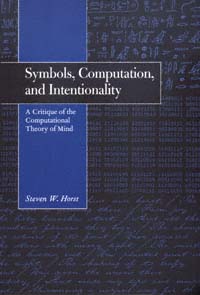 | Title: Symbols, computation, and intentionality: a critique of the computational theory of mind Author: Horst, Steven W 1960- Published: University of California Press, 1996 Subjects: Philosophy | Social and Political Thought | Psychology Publisher's Description: The computational theory of mind - the belief that the mind can be likened to a computer and that cognitive states possess the generative and compositional properties of natural languages - has proven enormously influential in recent philosophical studies of cognition. In this carefully argued critique, Steven Horst pronounces the theory deficient. He refutes its claims and assumptions, particularly the assertion that symbolic representations need not have conventional meaning. Horst goes on to sketch a new methodology for looking at the philosophy of psychology, one that provides a more fruitful way of comparing computational psychology with rival views emerging from connectionism and neuroscience. Original and comprehensive, his book is certain to provoke controversy and stimulate debate. [brief] Similar Items |
| 11. | 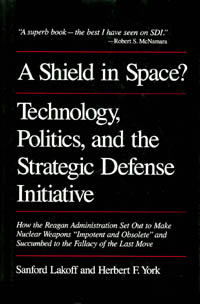 | Title: A shield in space?: technology, politics, and the strategic defense initiative: how the Reagan Administration set out to make nuclear weapons "impotent and obsolete" and succumbed to the fallacy of the last move Author: Lakoff, Sanford A Published: University of California Press, 1989 Subjects: Politics | Political Theory | Technology and Society Publisher's Description: In March 1983, Ronald Reagan made one of the most controversial announcements of his presidency when he called on the nation's scientists and engineers to develop a defensive shield so impenetrable as to make nuclear weapons "impotent and obsolete." This book provides the first comprehensive review and evaluation of the project launched to implement that announcement - the project officially known as the Strategic Defense Initiative and more popularly as "Star Wars." The authors - a political scientist and a physicist who has played a key role in developing military technologies - provide an intriguing account of how political rather than technical judgment led to the initial decision, and they explain the technical issues in terms accessible to nonspecialists. Judging SDI as "a classic example of misplaced faith in the promise of technological salvation," the authors examine the implications of the program for strategy, arms control, the unity of the Western alliance, its prospective economic impact, and the way the American political process has dealt with all these issues. [brief] Similar Items |
| 12. |  | Title: Permissible dose: a history of radiation protection in the twentieth century Author: Walker, J. Samuel Published: University of California Press, 2000 Subjects: Science | Environmental Studies | American Studies | United States History | Technology and Society Publisher's Description: How much radiation is too much? J. Samuel Walker examines the evolution, over more than a hundred years, of radiation protection standards and efforts to ensure radiation safety for nuclear workers and for the general public. The risks of radiation - caused by fallout from nuclear bomb testing, exposure from medical or manufacturing procedures, effluents from nuclear power, or radioactivity from other sources - have aroused more sustained controversy and public fear than any other comparable industrial or environmental hazard. Walker clarifies the entire radiation debate, showing that permissible dose levels are a key to the principles and practices that have prevailed in the field of radiation protection since the 1930s, and to their highly charged political and scientific history as well. [brief] Similar Items |
| 13. | 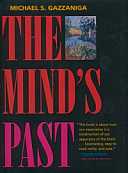 | Title: The mind's past Author: Gazzaniga, Michael S Published: University of California Press, 1998 Subjects: Science | Psychology | Cognitive Science | Neuroscience Publisher's Description: Why does the human brain insist on interpreting the world and constructing a narrative? In this ground-breaking work, Michael S. Gazzaniga, one of the world's foremost cognitive neuroscientists, shows how our mind and brain accomplish the amazing feat of constructing our past - a process clearly fraught with errors of perception, memory, and judgment. By showing that the specific systems built into our brain do their work automatically and largely outside of our conscious awareness, Gazzaniga calls into question our everyday notions of self and reality. The implications of his ideas reach deeply into the nature of perception and memory, the profundity of human instinct, and the ways we construct who we are and how we fit into the world around us.Over the past thirty years, the mind sciences have developed a picture not only of how our brains are built but also of what they were built to do. The emerging picture is wonderfully clear and pointed, underlining William James's notion that humans have far more instincts than other animals. Every baby is born with circuits that compute information enabling it to function in the physical world. Even what helps us to establish our understanding of social relations may have grown out of perceptual laws delivered to an infant's brain. Indeed, the ability to transmit culture - an act that is only part of the human repertoire - may stem from our many automatic and unique perceptual-motor processes that give rise to mental capacities such as belief and culture.Gazzaniga explains how the mind interprets data the brain has already processed, making "us" the last to know. He shows how what "we" see is frequently an illusion and not at all what our brain is perceiving. False memories become a part of our experience; autobiography is fiction. In exploring how the brain enables the mind, Gazzaniga points us toward one of the greatest mysteries of human evolution: how we become who we are. [brief] Similar Items |
| 14. | 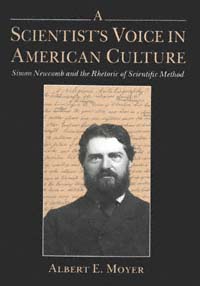 | Title: A scientist's voice in American culture: Simon Newcomb and the rhetoric of scientific method Author: Moyer, Albert E 1945- Published: University of California Press, 1992 Subjects: History | History and Philosophy of Science | United States History Publisher's Description: In late nineteenth-century America, Simon Newcomb was the nation's most celebrated scientist and - irascibly, doggedly, tirelessly - he made the most of it. Officially a mathematical astronomer heading a government agency, Newcomb spent as much of his life out of the observatory as in it, acting as a spokesman for the nascent but restive scientific community of his time.Newcomb saw the "scientific method" as a potential guide for all disciplines and a basis for all practical action, and argued passionately that it was of as much use in the halls of Congress as in the laboratory. In so doing, he not only sparked popular support for American science but also confronted a wide spectrum of social, cultural, and intellectual issues. This first full-length study of Newcomb traces the development of his faith in science and ranges over topics of great public debate in the Gilded Age, from the reform of economic theory to the recasting of the debate between science and religion. Moyer's portrait of a restless, eager mind also illuminates the bustle of late nineteenth-century America. [brief] Similar Items |
| 15. | 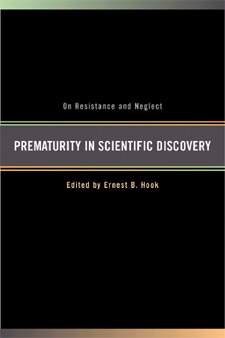 | Title: Prematurity in scientific discovery: on resistance and neglect Author: Hook, Ernest B 1936- Published: University of California Press, 2002 Subjects: Science | History of Science | Social and Political Thought | Geology | Evolution | Physics | History of Medicine Publisher's Description: For centuries, observers have noted the many obstacles to intellectual change in science. In a much-discussed paper published in Scientific American in 1972, molecular biologist Gunther Stent proposed an explicit criterion for one kind of obstacle to scientific discovery. He denoted a claim or hypothesis as "premature" if its implications cannot be connected to canonical knowledge by a simple series of logical steps. Further, Stent suggested that it was appropriate for the scientific community to ignore such hypotheses so that it would not be overwhelmed by vast numbers of false leads. In this volume, eminent scientists, physicians, historians, social scientists, and philosophers respond to Stent's thesis. [brief] Similar Items |
| 16. | 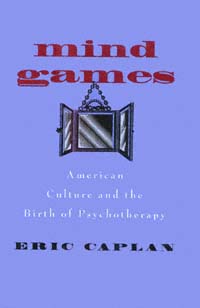 | Title: Mind games: American culture and the birth of psychotherapy Author: Caplan, Eric 1962- Published: University of California Press, 1998 Subjects: History | United States History | American Studies | Science | History and Philosophy of Science Publisher's Description: Eric Caplan's fascinating exploration of Victorian culture in the United States shatters the myth of Freud's seminal role in the creation of American psychotherapy. Resurrecting the long-buried "prehistory" of American mental therapeutics, Mind Games tells the remarkable story of how a widely assorted group of actors - none of them hailing from Vienna or from any other European city - compelled a reluctant medical profession to accept a new role for the mind in medicine. By the time Freud first set foot on American soil in 1909, as Caplan demonstrates, psychotherapy was already integrally woven into the fabric of American culture and medicine.What came to be known as psychotherapy emerged in the face of considerable opposition, much - indeed most - of which was generated by the medical profession itself. Caplan examines the contentious interplay within the American medical community, as well as between American physicians and their lay rivals, who included faith-healers, mind-curists, Christian Scientists, and Protestant ministers. These early practitioners of alternative medicine ultimately laid the groundwork for a distinctive and much heralded American type of psychotherapy. Its grudging acceptance by both medical elites and rank and file physicians signified their understanding that reliance on physical therapies to treat nervous and mental symptoms compromised their capacity to treat - and compete - effectively in a rapidly expanding mental-medical marketplace. Mind Games shows how psychotherapy came to occupy its central position in mainstream American culture. [brief] Similar Items |
| 17. | 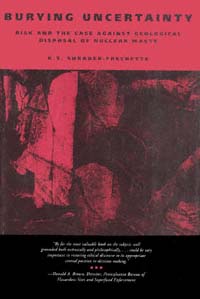 | Title: Burying uncertainty: risk and the case against geological disposal of nuclear waste Author: Shrader-Frechette, K. S. (Kristin Sharon) Published: University of California Press, 1993 Subjects: Science | Ecology | Public Policy Publisher's Description: Shrader-Frechette looks at current U.S. government policy regarding the nation's high-level radioactive waste both scientifically and ethically.What should be done with our nation's high-level radioactive waste, which will remain hazardous for thousands of years? This is one of the most pressing problems faced by the nuclear power industry, and current U.S. government policy is to bury "radwastes" in specially designed deep repositories.K. S. Shrader-Frechette argues that this policy is profoundly misguided on both scientific and ethical grounds. Scientifically - because we cannot trust the precision of 10,000-year predictions that promise containment of the waste. Ethically - because geological disposal ignores the rights of present and future generations to equal treatment, due process, and free informed consent.Shrader-Frechette focuses her argument on the world's first proposed high-level radioactive waste facility at Yucca Mountain, Nevada. Analyzing a mass of technical literature, she demonstrates the weaknesses in the professional risk-assessors' arguments that claim the site is sufficiently safe for such a plan. We should postpone the question of geological disposal for at least a century and use monitored, retrievable, above-ground storage of the waste until then. Her message regarding radwaste is clear: what you can't see can hurt you. [brief] Similar Items |
| 18. |  | Title: Mobilizing against nuclear energy: a comparison of Germany and the United States Author: Joppke, Christian Published: University of California Press, 1993 Subjects: Politics | Environmental Studies | German Studies | American Studies | Sociology Publisher's Description: In the past two decades young people, environmentalists, church activists, leftists, and others have mobilized against nuclear energy. Anti-nuclear protest has been especially widespread and vocal in Western Europe and the United States. In this lucid, richly documented book, Christian Joppke compares the rise and fall of these protest movements in Germany and the United States, illuminating the relationship between national political structures and collective action. He analyzes existing approaches to the study of social movements and suggests an insightful new paradigm for research in this area. Joppke proposes a political process perspective that focuses on the interrelationship between the state and social movements, a model that takes into account a variety of forces, including differential state structures, political cultures, movement organizations, and temporal and contextual factors.This is an invaluable work for anyone studying the dynamics of social movements around the world. [brief] Similar Items |
| 19. | 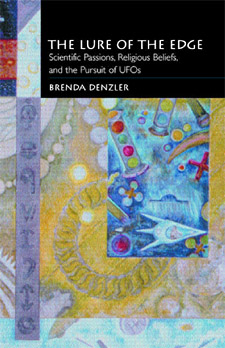 | Title: The lure of the edge: scientific passions, religious beliefs, and the pursuit of UFOs Author: Denzler, Brenda 1953- Published: University of California Press, 2001 Subjects: Religion | Science | Sociology Publisher's Description: UFO phenomena entered American consciousness at the beginning of the Cold War, when reports from astonished witnesses of encounters with unknown aerial objects captured the attention of the United States military and the imagination of the press and the public. But when UFOs appeared not to be hostile, and when some scientists pronounced the sightings to be of natural meteorological phenomena misidentified due to "Cold War jitters," military interest declined sharply and, with it, further overt scientific interest. Yet sighting reports didn't stop and UFOs entered the public imagination as a cultural myth of the twentieth century. Brenda Denzler's comprehensive, clearly written, and compelling narrative provides the first sustained overview and valuation of the UFO/alien abduction movement as a social phenomenon positioned between scientific and religious perspectives. Demonstrating the unique place ufology occupies in the twentieth-century nexus between science and religion, Denzler surveys the sociological contours of its community, assesses its persistent attempt to achieve scientific legitimacy, and concludes with an examination of the movement's metaphysical or spiritual outlook. Her book is a substantial contribution to our understanding of American popular culture and the boundaries of American religion and to the debate about the nature of science and religion. Denzler presents a thorough and fascinating history of the UFO/abduction movement and traces the tensions between those who are deeply ambivalent about abduction narratives that seemingly erode their quest for scientific credibility, and the growing cultural power of those who claim to have been abducted. She locates the phenomenon within the context of American religious history and, using data gathered in surveys, sheds new light on the social profile of these UFO communities. The Lure of the Edge succeeds brilliantly in repositioning a cultural phenomenon considered by many to be bizarre and marginal into a central debate about the nature of science, technology, and the production of a modern myth. [brief] Similar Items |
| 20. |  | Title: Possessing nature: museums, collecting, and scientific culture in early modern Italy Author: Findlen, Paula Published: University of California Press, 1994 Subjects: History | History and Philosophy of Science | European History | Renaissance History Publisher's Description: In 1500 few Europeans regarded nature as a subject worthy of inquiry. Yet fifty years later the first museums of natural history had appeared in Italy, dedicated to the marvels of nature. Italian patricians, their curiosity fueled by new voyages of exploration and the humanist rediscovery of nature, created vast collections as a means of knowing the world and used this knowledge to their greater glory.Drawing on extensive archives of visitors' books, letters, travel journals, memoirs, and pleas for patronage, Paula Findlen reconstructs the lost social world of Renaissance and Baroque museums. She follows the new study of natural history as it moved out of the universities and into sixteenth- and seventeenth-century scientific societies, religious orders, and princely courts. Findlen argues convincingly that natural history as a discipline blurred the border between the ancients and the moderns, between collecting in order to recover ancient wisdom and the development of new textual and experimental scholarship. Her vivid account reveals how the scientific revolution grew from the constant mediation between the old forms of knowledge and the new. [brief] Similar Items |